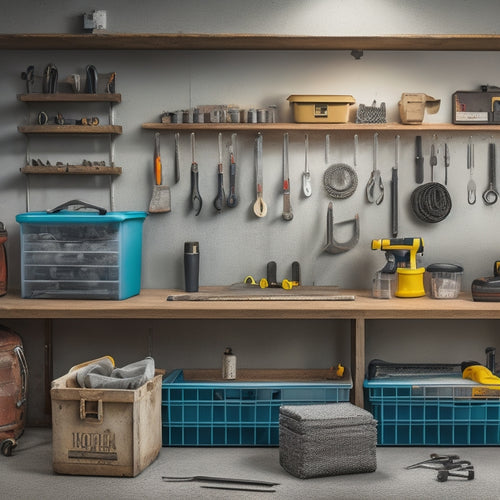
Top 3 Sealant Application Tools for Concrete Walls
Share
When it comes to sealing your concrete walls, the right application tool is essential for a professional finish. You'll want to take into account three top tools: sealant guns for high-pressure output on large areas, caulk tubes for precise flow control on intricate details, and sealant applicator kits that combine multiple tools for versatility. Each tool is designed to work efficiently with various sealant types, ensuring you get the best results for your project. By choosing the right tool, you'll save time and effort, and achieve a strong bond - now, discover how to get the most out of your chosen tool.
Key Takeaways
• For concrete walls, high-pressure sealant guns are ideal for applying thick sealants to large areas efficiently.
• Caulk tubes provide precise flow control, making them perfect for intricate details and small projects on concrete walls.
• Sealant applicator kits offer versatility in applications, combining multiple tools for a professional finish on concrete walls.
• Adjustable flow rates and precision nozzles in sealant tools ensure uniform and consistent application for a strong bond on concrete.
• Ergonomic handles and easy-to-clean designs in sealant tools improve user comfort and simplify maintenance during concrete wall sealing projects.
Choosing the Right Sealant Tool
When it comes to sealing concrete walls, selecting the right sealant tool is essential to achieving a successful and long-lasting application.
You'll want to take into account the type of sealant you're using, as well as the application technique you'll be employing. For example, if you're using a solvent-based sealant, you'll need a tool that can handle the solvent's viscosity and evaporation rate. On the other hand, if you're using a water-based sealant, you'll want a tool that can handle the sealant's flow rate and surface tension.
Different sealant types require different application techniques, and your tool should be able to accommodate these variations. Are you using a spray, brush, or roller application? Each method requires a specific tool design and functionality.
By choosing the right sealant tool, you'll be able to achieve a uniform, consistent application that guarantees a strong bond between the sealant and the concrete. With the right tool, you'll be able to work efficiently and effectively, saving you time and effort in the long run.
Essential Features to Consider
You'll want to look for a sealant tool that incorporates features tailored to your specific application needs, such as adjustable flow rates, precision nozzles, and ergonomic handles. These features will allow you to achieve a smooth, consistent application that meets your project's requirements.
When it comes to application techniques, consider a tool that can accommodate various bead sizes and patterns. This versatility will give you the freedom to adapt to different surface types and project demands.
Additionally, think about the importance of surface preparation. A tool that allows for easy cleaning and maintenance will save you time and hassle in the long run. Look for features like removable nozzles and easy-to-clean designs that make surface preparation a breeze.
Top Tool Recommendations
Based on your specific application needs and the essential features discussed earlier, several top-rated sealant tools stand out for their ability to deliver smooth, consistent results on concrete walls.
These tools are designed to work efficiently with various sealant types and application techniques, ensuring a professional finish.
Here are the top 3 sealant application tools for concrete walls:
-
Sealant Guns: These tools are ideal for large-scale applications, offering high-pressure output and adjustable flow control. They're perfect for applying thick, high-build sealants to vertical or horizontal surfaces.
-
Caulk Tubes: For smaller, more intricate projects, caulk tubes are the way to go. They provide precise control over the sealant flow, making them ideal for decorative joints, corners, or edges.
-
Sealant Applicator Kits: These kits usually include a combination of tools, such as guns, tubes, and nozzles, designed to work with specific sealant types. They're great for professionals who need versatility and flexibility in their application techniques.
Frequently Asked Questions
Can I Use a Sealant Tool on Freshly Poured Concrete Walls?
You shouldn't apply sealants to fresh concrete walls immediately; wait until they've fully cured, usually 28 days, to guarantee a strong bond. Proper sealant timing is key to a successful, long-lasting seal.
How Do I Clean and Maintain My Sealant Application Tool?
You'll extend your sealant tool's lifespan by cleaning it with solvent and a soft brush after each use, and storing it in a dry place, employing these simple maintenance techniques to guarantee freedom from tool failure.
Are Sealant Application Tools Suitable for Vertical Surface Applications?
When tackling vertical surfaces, you'll find that sealant application tools are indeed suitable, allowing you to master various vertical surface techniques with ease, while maintaining high sealant tool efficiency to get the job done quickly.
Can I Use a Sealant Tool for Applying Epoxy or Polyurethane Coatings?
You can use a sealant tool for applying epoxy or polyurethane coatings, but consider the epoxy application specifics and polyurethane benefits, like flexibility and UV resistance, to guarantee the right tool for your project's unique needs.
Are Sealant Tools Compatible With Different Types of Sealant Materials?
You'll want to guarantee sealant compatibility by considering material properties, like viscosity and flow rate, when choosing a tool, as not all tools are suitable for different types of sealants, such as epoxy or polyurethane.
Conclusion
You've got the perfect sealant, but now it's time to talk turkey - application tools.
With the right tool, your concrete walls will be sealed tighter than a drum, but with the wrong one, you'll be stuck with a mess on your hands.
You've narrowed it down to the top 3, and now it's time to get to work.
Get ready to seal like a pro and make your concrete walls shine like new!
Related Posts
-

Essential Tools for Painting Concrete Walls
When painting concrete walls, you'll need a range of specialized tools to achieve a professional-looking finish. Star...
-

7 Must-Have Tools for Concrete Repair Organization
To effectively organize your concrete repair projects, you'll need a thorough toolkit that includes a well-planned st...
-

Top Tools for Concrete Repair Success
When it comes to concrete repair success, you'll need a well-stocked toolkit with essential hand tools like trowels, ...


